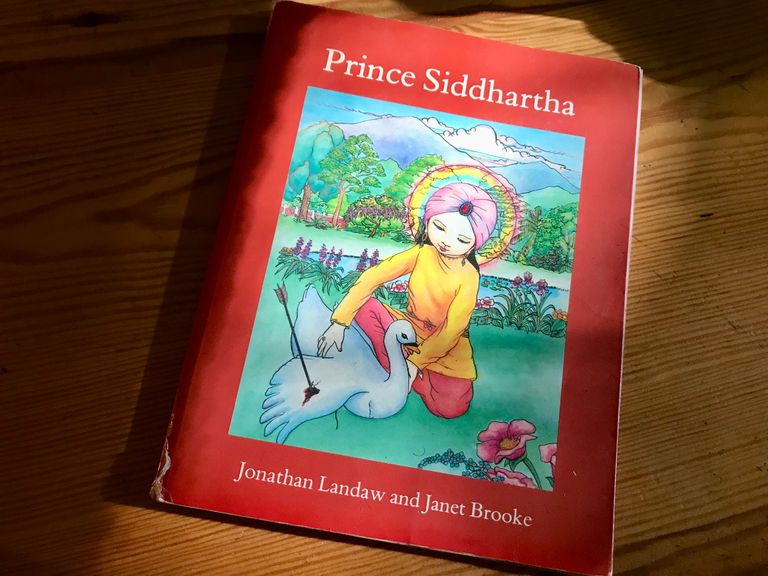
I came across a book for children recently called Prince Siddhartha which tells the life story of Buddha and aside from being profoundly moved by it I noted how much more powerful it was than the life story of Jesus. My entire childhood was focused on Christianity and I have read the bible multiple times, but not once was I ever taught about Prince Siddhartha and the tale of how he came became a Buddha. Ever the sceptic I would argue there is a nefarious reason behind the admission of this incredibly important story from the education of most Western children and society at large is worse off as a consequence.
Before I get into that I want first to show you some of the pages from this beautiful book which I just finished reading to my children last night.
The mother of Prince Siddhartha depicted here, calmly giving birth.

A large tree bent down one of its branches and the Queen took hold of it with her right hand. Supporting herself in this way, she gave birth to a son. The attendants cradled the baby in their arms and were amazed at how beautiful he was and how peaceful he seemed.
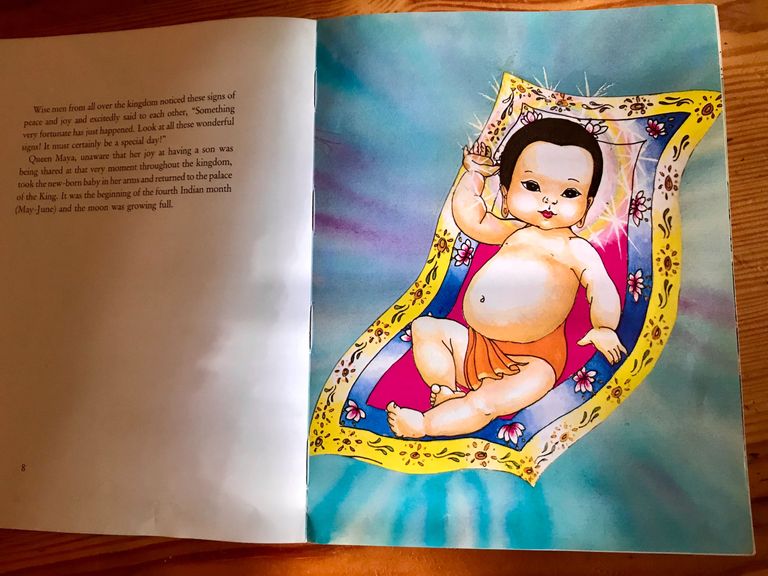
Wonderful art I think you will agree. Always depicting the Buddha with a halo around his head.
I enjoyed so many of the messages within this book but particularly the contrast between the many years spent within his pleasure palaces...
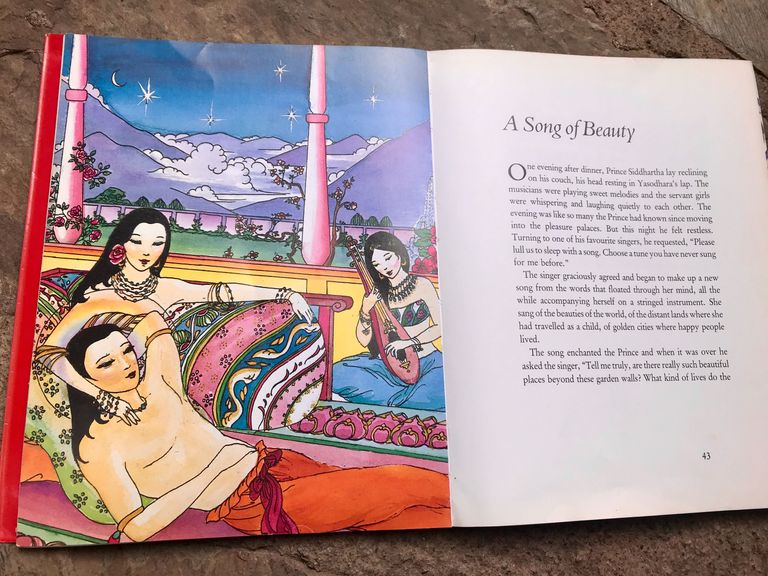
...and the six years spent meditating & eating only the seeds which fell into his lap.
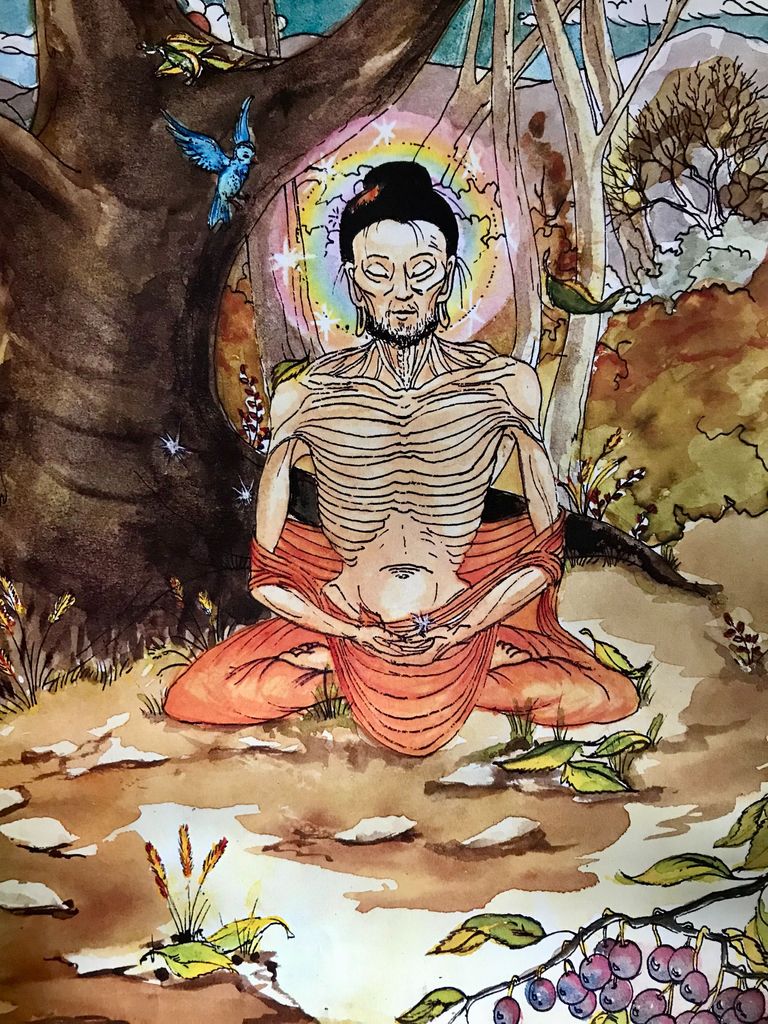
I had no idea he almost died on his quest for truth!
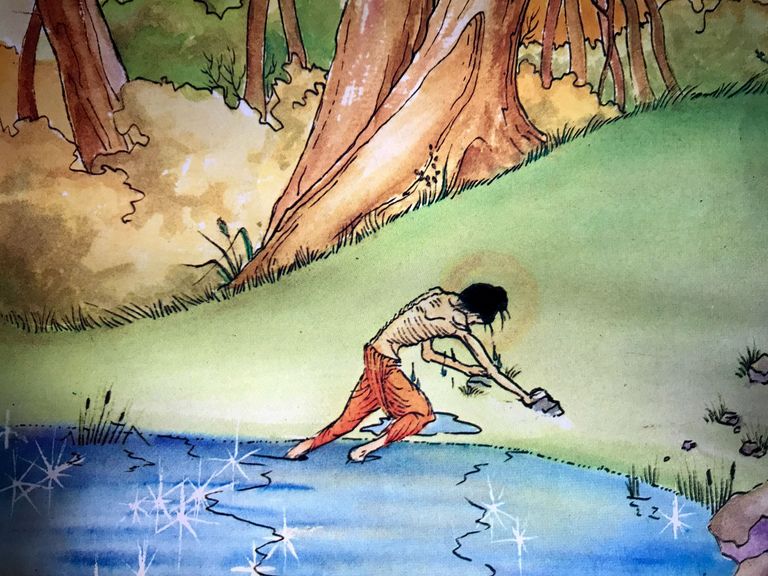
But only in this manner could he find the middle way and had either of these extremes not been present in his life, his mission would have been unsuccessful.
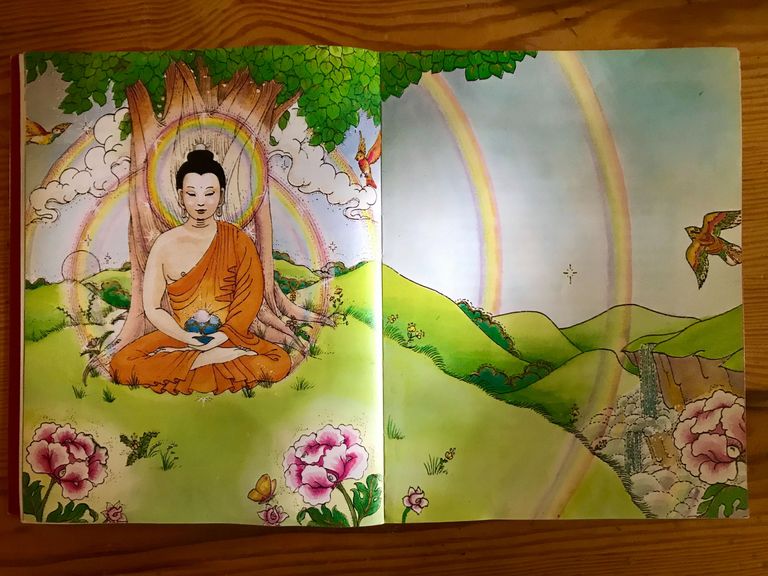
I also particularly enjoyed the story of his father who wanted so much for his son to stay with him and tend to the kingdom rather than follow the life of a homeless holy man.
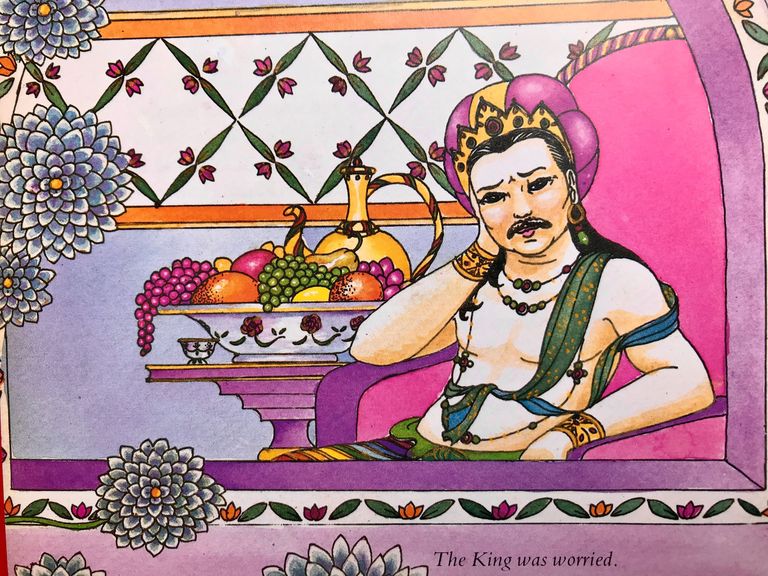
So desperate he was to control the fate of his son that he created a fake reality in which old and sick people were removed from sight. Even the wilting flowers were removed at night and the Prince grew up knowing only this reality of consistent youth & perfection.
But eventually of course he ventured outside the palace...
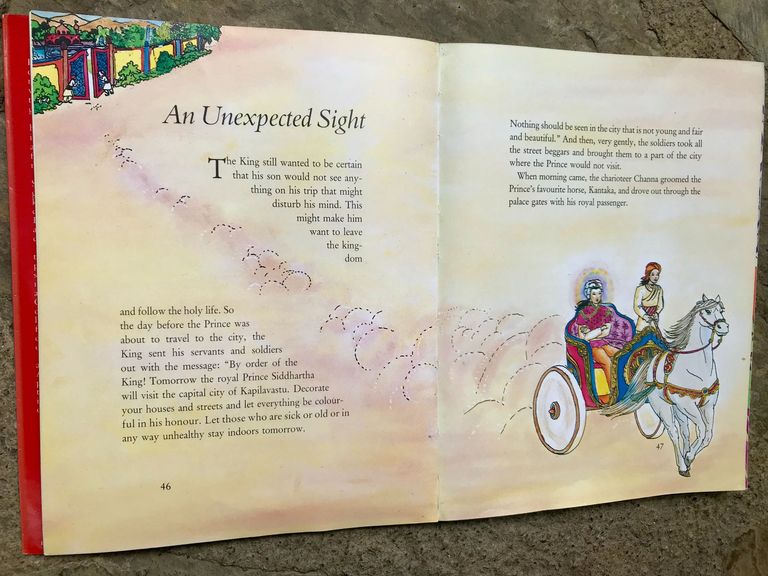
...and even though the King tried his best to continue the illusion everywhere his son went, the Universe ensured the young Prince saw what he needed to see.
A beautiful message which as a father I feel as if I understand better. Indeed, we cannot control the destiny of our children. Only guide them. And if we do try, the Universe will correct the balance.
If you are not already familiar with this story, I should probably mention that the Universe shows our young Prince Siddhartha a sick, an old and a dead person on each of his three trips outside the palace. And finally the illusion is broken.
After meditating on his new reality the Prince goes to his father with the following question:
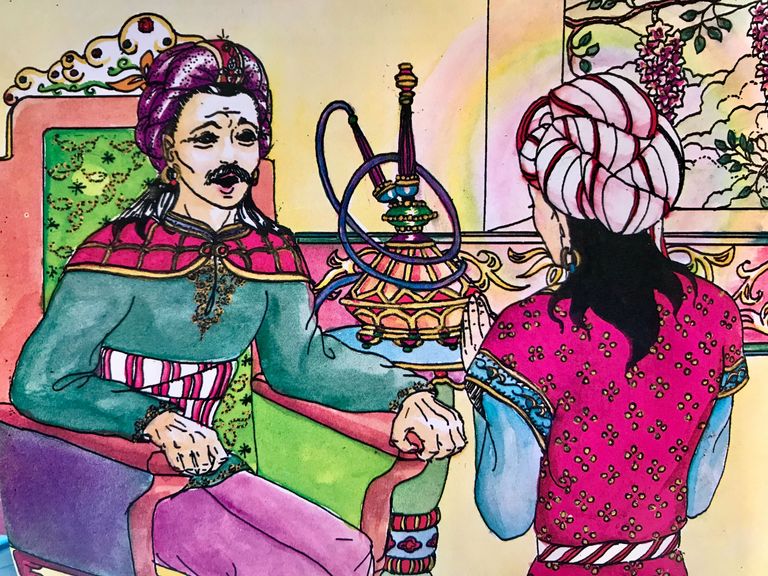
“O Father, I shall stay here only if you can promise me four things. Tell me that I shall never grow old, that I shall never become ill, that I shall never die, and that I shall never be unhappy. If you cannot promise me these things, then I must leave immediately.” The King was shocked by these strange words and began to get angry. “Forget these foolish ideas, Siddhartha,” he said loudly. But the Prince remained firm. “Father, if you cannot save me from the sufferings of old age, sickness, death, and unhappiness, then you must let me go and try to save myself. It is not right to keep me a prisoner here.”
His father could not make this promise of course and continued to demand his obedience. And so the Universe created the perfect moment for Siddhartha to escape.
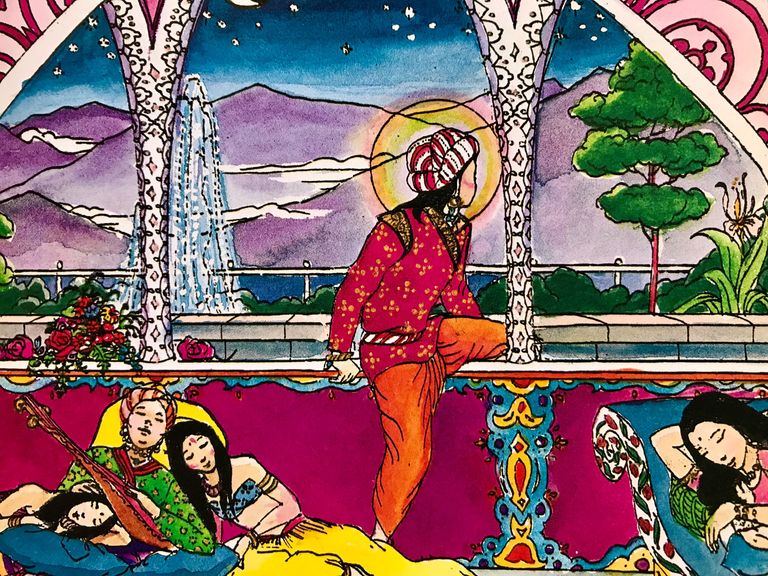
On a great quest to put an end to suffering! Which ultimately he achieved.
The death stories of Christ & Buddha
As beings who must live within mortal skins it is impossible to not be fascinated with the subject of death so the way in which our spiritual leaders meet their end is extremely important.
When Jesus was about to give up his life on the cross (after being betrayed by the people he loved) he said this:
"My God, my God, why hast thou forsaken me? Father, unto thy hands I commend my spirit. It is finished."
There is a feeling of hopelessness to his last words which seem out of sync with the overall message of his life. Yet that is what we are given.
Personally I was so struck by the crucifixion story that at the age of twelve I painted this image and stuck it to my wall throughout my teenage years to remind me of his sacrifice and keep my behaviour in check.

It isn't an original piece but I'm sorry to say I can't remember where I copied it from.

Regardless, taking the time to copy such a thing and place it on my wall for so many years is evidence enough of how deeply this story affected me.
This and the concept of hell which has the capacity to dominate a young person's life when they are taught to fear it as I was.
So, now let's check out the death of Buddha.
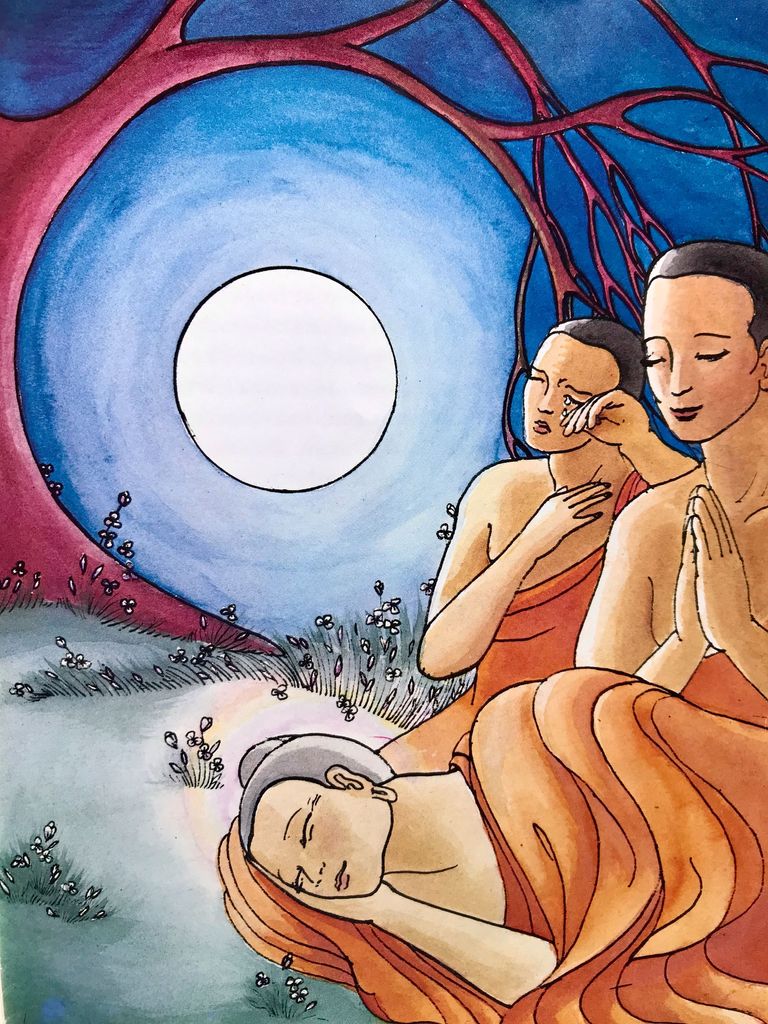
Then Buddha spoke for the last time. “Remember what I have taught you. Craving and desire are the cause of all unhappiness. Everything sooner or later must change, so do not become attached to anything. Instead devote yourself to clearing your mind and finding true, lasting happiness.”
Buddha then turned onto his right side and placed his right hand under his head. He closed his eyes and very peacefully passed away.
The difference between these two deaths is vast and I am wondering if I had been taught the story of Buddha in place of the story of Jesus, what a different life I may have had? Of course, understanding now the importance of extremes on our journey to find the balance, I am able to let it go, but if we apply this thought to the world's largest religion (Christianity) I cannot help but wonder if this hasn't had an effect on pretty much every aspect of life on Earth?
The prison disguised as freedom
Christianity has been permitted to become the number one religion in the world because it subtly teaches servitude over freedom, while also encouraging the ego-based age of materialism.
Who is more free? The man who buys his food every day from the shops with a sense of satisfaction for the cycle of work, money & food on his table or the man who has no money and begs for his food every day with nothing more than humility & gratitude in his heart?
Buddhism encourages a simple life without material possessions or emotional attachments and while Christianity doesn't necessarily encourage the opposite of this, it is very possible to be a multi-millionaire business tycoon with mansions on every continent and a life filled with materialistic possessions & emotional attachments while at the same time upholding the values of a Christian. Come to think of it, wealthy materialistic tycoon Christians are regarded in high esteem by many these days. Trump comes to mind straight away.
Buddhists shave their heads and wear the same clothes so there is no sense of inequality or chance for comparison when they meet. While Christians are encouraged to wear their best suits at church every Sunday so they may get a sense for how well (or not) each family is doing in the money department.
I know it's subtle but can you see how this opportunity for comparison basically just encourages matters of the ego which lead to competition and materialism? While Buddhism encourages the exact opposite. And don't get me wrong, I'm not saying we should all strive to look the same! Just making observations about these two religions.
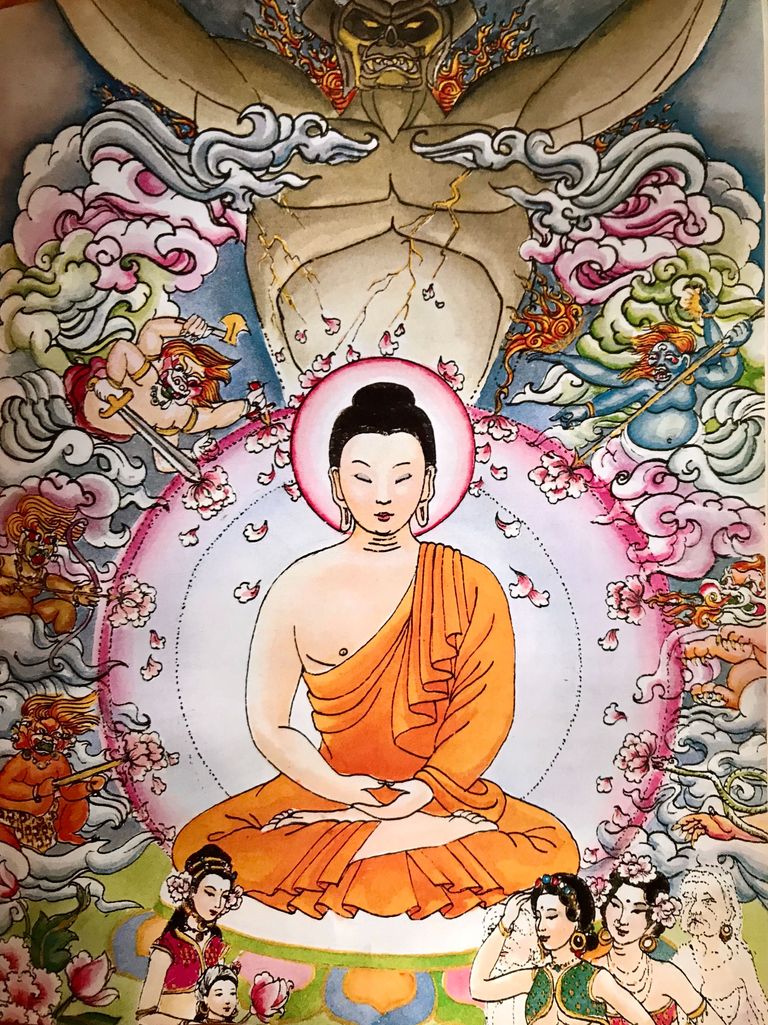
Even the idea of being in debt to Christ (who gave up his life on the cross for our sins) sets us up for a life in which being in debt is considered normal. And living in fear of going to hell is no way to live at all! Yet Christians believe we can expect eternal damnation after death if we don't accept their one 'true' God and stick to his rules in this life. Which basically relaxes us into a life in which sticking to the rules (created by some distant entity) is considered normal.
This is in direct contrast to the teachings of Buddha which not only encourage us to respect other religions & spiritual teachers but more importantly they tell us how the eternal soul is incarnated over and over in multiple physical bodies, ultimately helping us shed our fear of death.
Buddha couldn't care less who we worship and certainly doesn't encourage anyone to worship him. Instead he shows respect to all humans (and animals alike) while keeping his focus on teaching us to live in the here & now, in a way which brings an end to all suffering.
If the USA was full of Buddhists instead of Christians can you imagine what a different place it would be? Perhaps you can't but I would say life would be better there. A lot better!
You see, the ego-based age of materialism goes hand in hand with our current subjugation and the drive towards a new digital era, the Fourth Industrial Revolution. And our obedience is required! But you cannot sell this dream to a Buddhist. While a Christian can remain true to his religion all the way to his transhumanist/cyborg future.
You can download a PDF of the book Prince Siddhartha from here. I highly recommend you get familiar with this story if you don't already know it.
Looking forward to hearing your thoughts.
Love & Light everyone 🌱
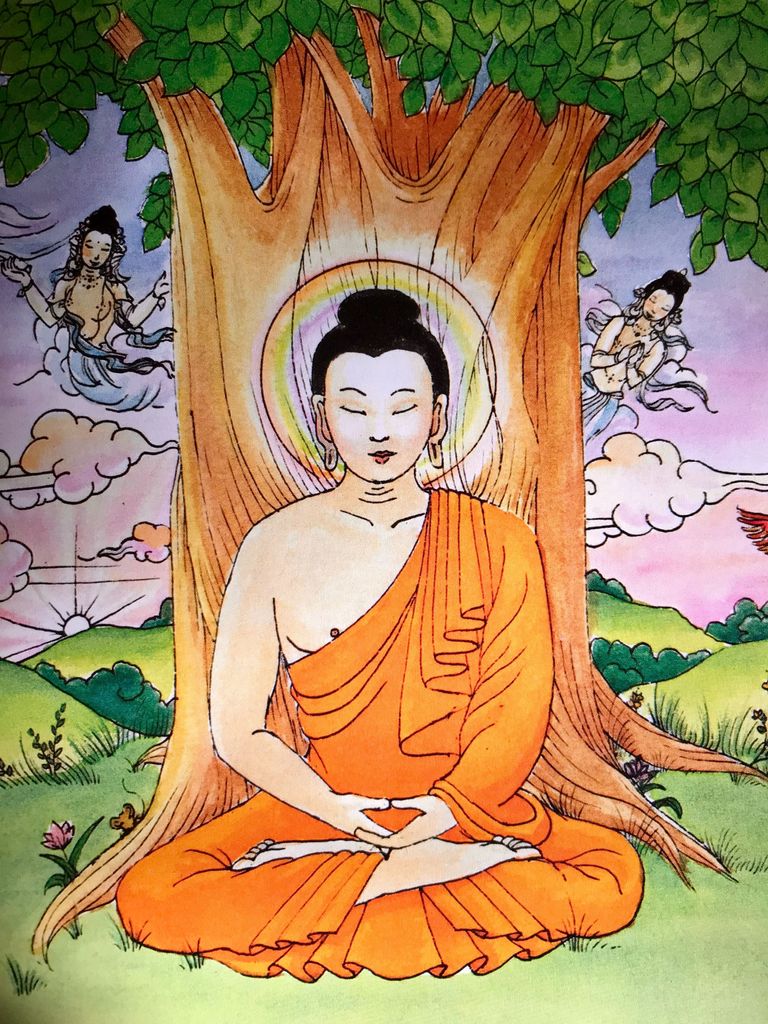
All the messianic monotheisms are the same. Unlike you, I had an aversion even as a young child. I later invented my own meditation - age 7, i think (I didn't note down the age but recall where I was and how tall. lol) What I experienced was something no priest ever spoke about.
The Vatican website has been rearranged, so haven't looked for it again, but there is a papal bull about how to convert Asia; therein lies the plan and, interestingly for your post, Buddhism is seen as the biggest threat - due to its innate superiority. Its weakness is in terms of proselytizing and hence spreading. Buddhism is fundamentally about experiences and not beliefs - that seems to be both its strength and weakness, as most people will gladly buy a basket-full of beliefs than grow their own fruit. ;-)
found it = https://www.vatican.va/content/john-paul-ii/en/apost_exhortations/documents/hf_jp-ii_exh_06111999_ecclesia-in-asia.html
Once upon a time, I used to translate some of the Osservatore Romano inot English, especially the science stories that would mysteriously never appear in the English weekly. Anyway, no more, as it sits behid a paywall now! Ah... that Catholic mission.
Also, read this recent empty gesture = https://www.vatican.va/content/francesco/en/speeches/2022/may/documents/20220528-buddisti-mongolia.html
followed by this 500 year-old "right of domination" = https://www.cbc.ca/radio/tapestry/why-religion-1.4934033/indigenous-activist-urges-the-vatican-to-revoke-500-year-old-documents-1.4940937
The Roman Catholic Church was founded with a mission to carry on the Roman Empire through "spiritual" means. Everything else is secondary.
This is beautifully put. It makes sense Buddhism would have been seen as a threat to the Vatican. Though it seems like that threat has been neutralised now.
Amazing you were creating your own meditations so young! And well done for feeling the aversion so clearly. Not sure why I fell for it all those years ago? It was a pretty extreme school and Christianity probably felt like a refuge of sorts.
Thanks! :-) my grandfather was also an early influence; he hated priests, so on a Sunday he'd take me to the local cinema, thereby "pretending" to go to mass. lol. A bit like the movie Cinema Paradiso.
I never quite fathomed what people actually did in church.
One interesting thing I recall was how much mental energy it took to stop the hypnotic suggestions taught as "prayers". Many years later, I did actually break a hypnotic suggestion - as part of training, and to show that I could - and it felt exactly the same as not-praying. All entranced believers!
Funny you should post this now as have been thinking about something similar. Your view of Christianity is pretty warped tho by what you were taught (me too) but if you look at Jesus' teachings and take out the changes that were made you will find that there are more similarities between Buddha and Jesus than differences.
Jesus did not want a church built in his name and all the original apostles that went out to teach were vegetarian. They preached turn the other cheek and do no harm just the same as Buddha. There's also the thing about a rich man and the eye of a needle so he didn't condone riches.
I also think a lot of the translations are misleading in the KJ and others plus there are the books that were left out.
As for the old testaments don't get me started on them, full of satanism if you ask me.
Those last words on the cross have also always bothered me so I chose to regard them as wrongly heard or badly translated. I mean why would he say that when he knew he was going to die on the cross, that it would not be easy. It makes no sense at all. It has to be wrong.
There are theories that the two are the same person, that Jesus didn't die on the cross and his burial place is somewhere in Nepal. Lot's of strange stories abound.
Totally agree Buddha & Jesus were cut from the same cloth. Same lessons, just taken in different directions over the years to facilitate the divide & conquer game. It is my belief that most of the old churches & cathederals were not built for worship and many are much older than we are being told, so Christianity provided an opportunity to re-purpose these buildings to become places of worship, forever hiding their true purpose from us. Which I believe related to energy production & healing. Matters of resonance rather than matters of religion.
And yes, they took the vegetarian bits out for obvious reasons! In the (removed) Essene gospels Jesus also talks about sun-gazing. Which has the capacity to change us fundamentally! So they cut it out.
Love that camel/needle quote. Think most Christians forgot it these days. Rich Christians are all over the place! Rich Buddhists too probably ;)
Love that idea! You could well be right. One teaching split into two so that the members of each side can never see the whole.
Thanx, good to see you know all this stuff too. Yeh the new testaments mostly only talk of 3 years in Jesus' life. What was he doing for the other 30 years lol. Plus where did he go once he was raised from the dead? It all fits in.
No…
Jesus was simply quoting Psalm 22.
For the people in the crowd that understood Hebrew they knew what he was telling them.
To go read Psalm 22.
If you can read Hebrew and understand Hebrew you will find his name there in Psalm 22 ....
Yeshua.
yud-shin-vav-ayin
so he was about to recite the whole of it and psalm 23 but passed out you say?
Nope.
He just needed to say exactly the words he said.
It was enough for the Mystics to understand.
Psalm 22.
The suffering Messiah spoken of in the mystical books.
This is how they understood that he was God Himself.
But what is God ?
It is written somewhere, that Jesus came from Asia with his buddhism knowledge... Bringing it to the middle east.
In the end, it is all the same message... Just interpreted wrongly over hundreds and even thousands of years...
I see this differently... He did this for me... Without ever demanding anything for it... Neither from me, nor from anybody else... He did it for love... Nothing more... Nothing less... ;)
Awesome post! Peace buddy! 🙏
I do agree it's all the same message, just guided in different directions over the years. And it totally makes sense that he spent time in India! Thought the mainstream narrative seems to deny this. Probably to keep Jesus & Buddha feeling separate in their origins. Divide & conquer is only effective if people take sides.
Not sure why I felt so in debt to Christ as a child? Think it was just the way in which Christianity was presented to me.
Peace :)
Probably because they told you so...?
"I am the light which is on them all. I am the All, and the All has gone out from me and the All has come back to me. Cleave the wood: I am there; lift the stone and thou shalt find me there!"
Jesus of Nazareth
Saying 77, Gospel of Thomas
A beautiful children's book, I would think. There's nothing wrong with reading it to children, as long as you don't overload them with it.
Buddha is said to have died at an advanced age (around eighty years). He suffered from rheumatism and aching bones. A "peaceful" death like Buddha's and an unpeaceful death like Jesus' reflect a contrasting role in the grand scheme of events and religions, but for me they have an identical message: some people die in agony and great suffering, others fall asleep peacefully.
But no one is free from suffering, be it old age and illness or violence. Jesus' sacrifice and his desperate cry of "My God, my God, why me?", for example, has something deeply human about it and people identify with him. In many ways, Christianity has handed down Jesus in a very human way, a role model that is not free of doubt or pain. The same with Buddha (as Siddharta).
Poverty and modesty may be held in high esteem, the beggar hurts no one and is content with alms. In the end, however, he receives these from people who work and can give something of their wealth. If everyone were poor, no one could beg because there would be nothing to beg for.
Every religion or theological view and its traditions have a very rich treasure of interpretations, writings and expressions in different directions. The writings of the Christians or the followers of the faith are just as fascinating as those of the Buddhists. But we, as Christians, have fouled our own nest if we hold in low esteem what we have inherited.
I wouldn't bet on it, as far as your idea of a better life is concerned, if, say, the USA were populated by predominantly Buddhists. The Orient and the Occident contrast with each other, and I think it's fair to say, without going too far out on a limb, that Asians tend to be less openly aggressive, while the West is more openly aggressive.
On the other hand, I would say that the meeting of these two worldview streams is something that can be approved of, because one learns from the other and new perspectives open up.
I would attack your conclusion that the Christian is obedient to authority and that it is Christianity or it is responsible for the fact that there are followers of transhumanism.
If you look to Japan, you will find quite extreme manifestations there, where dressing up, fascination with human changing technologies seems to be a big trend and transhumanism seems to be high there as well. Asians seem to me to be far more articulate and more used to accepting authority. Which I don't associate with religion necessarily, but rather with quite draconian forms of rule, warfare, etc.
I would rather say that it is the forgetting of deep Christian (or Buddhist or Hebrew, Islamic etc.) insights that makes people susceptible to ideas that elevate themselves to god-like status.
I would suspect that people who believe in nothing at all, or rely on no teachings, ridicule religion, etc., who accept no limits to human action and are cynical, who have nothing but arbitrariness at hand.
Aggressive atheism, for example, contributes nothing to shaping human coexistence; it is like the eternal critic who finds fault with everything but is not really interested in anything at all except unleashing his suffering and discomfort on the world.
In other words, it is not the devotees or the devoutly religious, but cynics, fatalists and the like who drag it all through the mud, but nowhere do or say anything that pacifies their form of existence. We should separate these from each other. What the church institutions (and also those from buddhist ad other backgrounds) do to preserve the establishment, on the other hand, is a different matter. It's not about faith, I think, but about protecting political or other interests.
Well… here in Canada … in Catholic High School we read the Book “Siddhartha” by Herman Hesse. It is one of my favourite books. Many Catholics decide to practice Buddhism after reading this book. I also became more interested in learning about Eastern Religions and Traditions … including the ancient Jewish mysticism of Jesus the Nazarene, Yeshua ha Notzri and realized how much Jesus has in common with Siddhartha. The Oneness of Everything… Non-Dualism of Advaita Vedanta and then I read some Baruch Spinoza and became a Pantheist.
Source: https://amzn.to/3T8xFH2
I really must read this. So many people have mentioned it recently. Amazing it has the power to turn Catholics into Buddhists.
Thank you for sharing a little of your story. Had to look up what Pantheist meant!
Well… the best part is that it made me do a lot of research into the Ancient Eastern Mystical Traditions and Religions … and see that Jesus was a great Buddhist. The ultimate teacher of Advaita Vedanta … especially when you learn and understand Hebrew and Aramaic.
🎉 I've just upvoted your (@samstonehill's) content. 🎉
Support Me Back 🙏
Try the apps which I've built for Blurt & for you.
Congratulations, your post has been curated by @scilwa, which is the curating account for @R2cornell's Discord Community.
Felicitaciones, su publicación ha sido votada por @scilwa. Puedes usar el tag #R2cornell. También, nos puedes encontrar en Discord